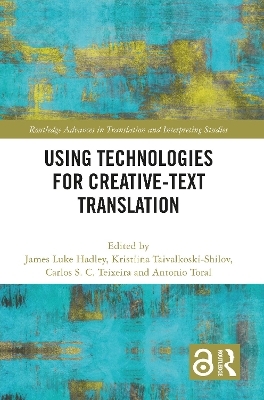
Using Technologies for Creative-Text Translation
Routledge (Verlag)
978-1-032-33384-7 (ISBN)
This collection reflects on the state of the art of research into the use of translation technologies in the translation of creative texts, encompassing literary texts but also extending beyond to cultural texts, and charts their development and paths for further research.
Bringing together perspectives from scholars across the discipline, the book considers recent trends and developments in technology that have spurred growing interest in the use of computer-aided translation (CAT) and machine translation (MT) tools in literary translation. Chapters examine the relationships between translators and these tools—the extent to which they already use such technologies, the challenges they face, and prevailing attitudes towards these tools—as well as the ethical implications of such technologies in translation practice. The volume gives special focus to drawing on examples with and beyond traditional literary genres to look to these technologies’ use in working with the larger group of creative texts, setting the stage for many future research opportunities.
The book will be of particular interest to students and scholars in translation studies, especially those with an interest in literary translation, translation technology, translation practice, and translation ethics.
Chapters 2 & 3 of this book are freely available as a downloadable Open Access PDF under a Creative Commons Attribution-Non Commercial-No Derivatives 4.0 license available at http://www.taylorfrancis.com
James Hadley is Trinity College Dublin’s Ussher Assistant Professor in Literary Translation and Director of the College’s MPhil in Literary Translation. His research represents his wide-ranging interests, many of which centre on translation in under-researched cultural contexts. His interests include machine translation and computer assisted translation research, as well as integrating empirical research into Translation Studies. Kristiina Taivalkoski-Shilov is Professor of Multilingual Translation Studies and Vice Head of the School of Languages and Translation Studies at the University of Turku. Her research interests include literary translation, translation history, and ethics of translation. Throughout her career, she has worked on the notion of "voice" in translation,which she has examined from theoretical, historical, and ethical perspectives. Carlos S. C. Teixeira is a Localisation Engineer at IOTA Localisation Services and Adjunct Professor, Universitat Rovira i Virgili. His research and publications have focussed on translation process research, notably the interaction between translators and technology in professional settings. With Routledge, he has authored a chapter on "Revising Computer-Mediated Translations" in Mossop, Brian. Revising and Editing for Translators, 4th edition (2020). Antonio Toral is Assistant Professor in Language Technology at the University of Groningen. He holds a PhD in Computational Linguistics from the Universitat d'Alacant and has carried out research in the area of machine translation (MT) since 2010. His research interests include the application of MT to literary texts, MT for under-resourced languages, and the analysis of translations produced by machines and humans.
Table of contents:
List of Contributors
Introduction
(By the four co-editors)
Chapter 1 - Collecting literary translators’ narratives: towards a new paradigm for technological innovation in literary translation
Paola Ruffo
Chapter 2 - Dutch literary translators' use and perceived usefulness of technology: role of awareness and attitude
Joke Daems
Chapter 3 - Human–computer Interaction in Pun Translation
Waltraud Kolb & Tristan Miller
Chapter 4 - Bilingual E-books via Neural Machine Translation and their Reception
Antoni Oliver, Antonio Toral & Ana Guerberof Arenas
Chapter 5 - Catching the Meaning of Words: Can Google Translate Convey Metaphor?
Alicja Zajdel
Chapter 6 - Pragmatic and Cognitive Elements in Literary Machine Translation. An assessment of an excerpt from J. Polzin’s Brood translated with Google, DeepL, and Bing
Paola Brusasco
Chapter 7 - The Oxen of the Sun Hypertext: A Digital Hypertext in the Study of Polyphonic Translations of James Joyce’s Ulysses.
Lauri A. Niskanen
Chapter 8 - Translating with technology: How digitalisation affects authorship and copyright of literary texts
Maarit Koponen, Sanna Nyqvist & Kristiina Taivalkoski-Shilov
Index
| Erscheinungsdatum | 23.04.2024 |
|---|---|
| Reihe/Serie | Routledge Advances in Translation and Interpreting Studies |
| Zusatzinfo | 24 Tables, black and white; 31 Line drawings, black and white; 1 Halftones, black and white; 32 Illustrations, black and white |
| Verlagsort | London |
| Sprache | englisch |
| Maße | 152 x 229 mm |
| Gewicht | 400 g |
| Themenwelt | Geisteswissenschaften ► Sprach- / Literaturwissenschaft ► Sprachwissenschaft |
| ISBN-10 | 1-032-33384-7 / 1032333847 |
| ISBN-13 | 978-1-032-33384-7 / 9781032333847 |
| Zustand | Neuware |
| Informationen gemäß Produktsicherheitsverordnung (GPSR) | |
| Haben Sie eine Frage zum Produkt? |
aus dem Bereich


